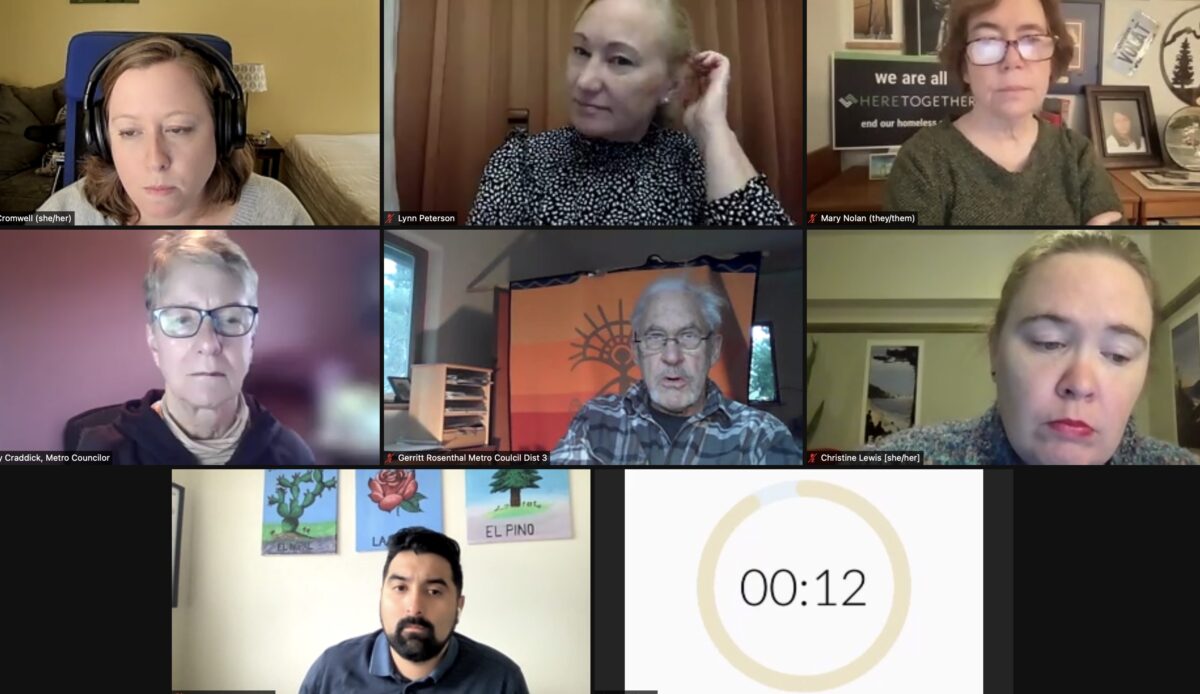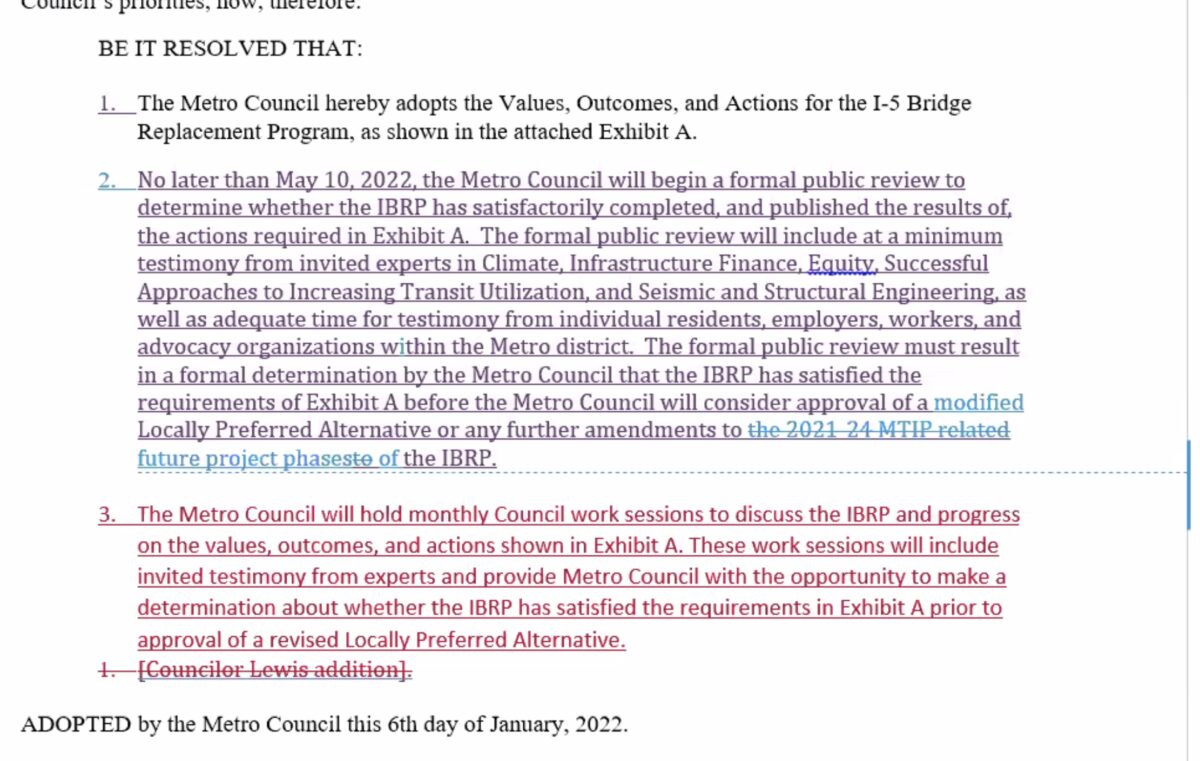
It was a mixed bag at Metro Council today as its six members tried to walk a fine line between allowing the I-5 Expansion/Interstate Bridge Replacement (IBR) project to move forward, and saving face with climate change activists — many of whom staged a protest rally against the project outside Metro headquarters Wednesday night.
On the agenda at Thursday’s council meeting were two key items: A Values, Outcomes, and Actions document meant to outline Metro’s expectations around the project, and a resolution to adopt an amendment to the Metropolitan Transportation Improvement Program (MTIP) to spend an additional $36 million to allow the IBR project team to continue planning the project.
As we’ve been reporting, there was a lot of tension around this vote because it’s a rare opportunity for Metro – one of eight official federal partners on the IBR project — to assert some influence over a freeway expansion project. Given the well-documented failure of the Columbia River Crossing project in 2013 (which this IBR project is based on) and heightened debate and urgency around the negative impacts of driving and freeways, Metro councilors were in the unenviable position of simultaneously staring down the freeway industrial complex and a burgeoning climate justice movement.
In the end, Metro Council blinked. They voted 5-1 in favor of funding the project, with Councilor Mary Nolan being the sole objector.
But it came with important progress for a coalition of advocacy groups who pushed Metro to ensure the project isn’t the climate change disaster some critics warn it could be.
“We are pleased to see the Metro Council… create clear goals and accountability mechanisms to meet the region’s goals for a sustainable, healthy, and effective transportation system,” read a statement after the meeting that was signed by No More Freeways, 1000 Friends of Oregon and The Street Trust. “We hope open communication and precise analysis of the options on the table will help ODOT and the IBR leadership right-size this project and create high quality multimodal transportation and positive community impacts.”
That coalition had a big impact on today’s proceedings. They convinced Metro to adopt three key additions to the Values, Outcomes, and Actions (VOA) document (below) that included commitments to lower vehicle miles traveled (VMT) reductions, conduct an “investment-grade” financial analysis to determine how wide the freeway needs to be, and to include a comprehensive health impact assessment for communities along the five-mile project corridor between Portland and Vancouver.
Advertisement
Below is the new text added to the VOA document. The first is Councilor Nolan’s amendment, followed by the three amendments from the advocacy coalition:
Councilor Nolan also added two pieces to the VOA that should increase transparency and accountability from the project team.
There was a significant amount of public comment at the meeting with all but two people speaking against the project. Portlander Paul Rippey used his three minutes to share an encore rendition of his hit single “Induced Demand” that I happened to capture a recording of (below):
It was clear throughout the meeting that a majority (if not all) of Metro Council isn’t comfortable with how wide I-5 proposals from the IBR team might be. During a thoughtful and detailed discussion about how to edit the text of the VOA document to make it as strong as possible, Metro Council President Lynn Peterson said, “The intent of this is to make sure that we’re right-sizing the bridge.”
But it was Councilor Nolan who was the strongest voice of skepticism against the IBR project staff. They repeatedly questioned the project team and was persistent in calling for stronger accountability language. Their amendment sought to give Metro the power to pull support for the project if the IBR team did not answer their questions or provide requested information. “If we’re going to support them [ODOT] in meeting their deadline for a locally preferred alternative [final design, which IBR says must come by this June, a deadline some say is nonexistent], we should be able to evaluate whether they’ve satisfied our request for due diligence.”
In the end, the VOA was adopted. Given that it’s just a document, it’s relatively strong and gives Metro much more power than they’ve had over previous megaprojects like the CRC. “This is something that wasn’t done last time,” Peterson said after the vote. “It sets a higher bar on how we proceed as a region.”
Then it was time to grapple with the $36 million question.
IBR Program Administrator Greg Johnson kicked off the discussion by telling council they don’t have as much power to “right-size” the bridge as they might have thought. He said the only tool the IBR team will use to determine the size of the bridge will be regional traffic modeling. That didn’t impress Councilor Shirley Craddick, who pointed out that, “Your data says we have a lot of cars and need a bigger bridge, but we can no longer accommodate that and have a healthy world, or maybe even a world at all… We’re basically saying we we can’t tolerate a bridge is 10 or 12 lanes wide.”
Johnson spoke strongly about the IBR project’s intentions to take climate change and other concerns seriously. But in the end, he said, “We must look at the data,” when it comes to determining the freeway design. He also responded to Metro’s concerns by saying they aren’t the only voice at the table. “I need everyone [on Metro Council] to understand that this is a bi-state program with eight partners that have individual needs… We’re trying to thread the needle to address all of those concerns,” he said.
Advertisement
President Peterson clearly wanted to maintain a positive relationship with the IBR project. She praised Johnson and thanked him for changing his tune over the past several months. “Greg, you came into this with a complete and utter trust deficit,” she said. “You have been willing to recognize that and have strived to rebuild trust… I just want to say thank you for that hard work and recognizing this is more than just a transportation project.”
When public comment started up again, Metro heard strong opposition and skepticism. State Rep Khanh Pham, a new member of the state’s powerful Joint Transportation Committee, said “I’m not sure why we need $36 million to answer these questions. Every dollar we spend on overbuilt freeways comes at a cost of not been able to fund other critical transportation needs.”
Pham also called out Johnson for his contention that the project faces a hard planning deadline. “When I talked with Metro staff and asked about these specific federal deadlines, I was told that there are no federal deadlines for this project; but it’s more that there’s a foot race around the region to compete with other projects.”
No More Freeways co-founder Aaron Brown said he thought Greg Johnson was “gaslighting” Metro Council and questioned whether ODOT’s trust deficit would be more accurately described as a “truth deficit”.
When it came time to vote, all the councilors expressed mixed feelings and discomfort, but every one of them except Mary Nolan, voted to support the $36 million amendment. Nolan said before their vote, “I’ve been disappointed by the indirectness and obfuscation I’ve heard from the two leaders of the project team… When given opportunities to embrace our requests, the project team director and deputy director have instead waffled. I vote no.”
When Councilor Gerritt Rosenthal answered his call for a vote with “I’m a provisional and conditional ‘yes'”, an exasperated Nolan could be seen shaking their head and we could hear them mumble under their breath, “It’s yes or no.”
Nolan (who won their seat by beating Chris Smith, a co-founder of No More Freeways) has emerged as Metro’s strongest freeway project skeptic. We haven’t heard the last of them on this project. And thanks in part to the strong Values statement Metro passed today and the community advocacy thus far, this won’t be the last chance to influence this project.
For more coverage of the meeting, check out my live Twitter thread
So the measure passes 5-1.
Nolan looks displeased.
When Councilor Rosenthal said he's a "provisional and conditional Yes" Nolan shook her head in disapproval and muttered "It's yes or no."
Thx for following along everyone.
— BikePortland (@BikePortland) January 7, 2022




